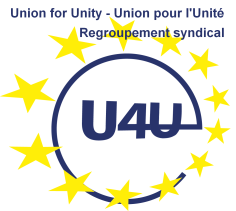
An open letter to the presidents of the European Institutions and to Members of the European Parliament: defend the European Union and its civil service!
 |
An open letter to the presidents of the European Institutions and to Members of the European Parliament: defend the European Union and its civil service! |
|
European citizens have been expecting and are still expecting a lot from Europe. But they want actions. Actions that are strong, united, cohesive and resolutely European. This has not been the case, at least at the start of this crisis. The pandemic has led to a great deal of disillusionment and criticism of the European project. In this context, the debate on the budget for the next programming period continues. Some use the pretext of the current crisis to propose downward revisions. Whereas we need a much more ambitious European budget to deal with the health crisis, to respond to the post-pandemic economic and social crisis, to deal with other crises that have not disappeared during the current health emergency, such as the climate issue, and finally to build the Europe of the future. The Commission made no mistake in reflecting on the need to upwardly revise its budgetary proposals. Despite this, the Council seems to be sticking to its line of reducing the budget, just as in the discussions that preceded the pandemic, and indeed some advocate further reductions. Further reductions will have dire consequences on the EUís capacity to act at a time when its citizens expect far-reaching policies in terms of combating climate change, sustainable employment, reducing inequalities, energy and industrial policy, human migration policy, common defense, public health, research and innovationÖ The pandemic is causing an economic recession which we already know will be of great magnitude, and which will have to be addressed at European level, the only level relevant to the single market and our interdependent economies. State-by-State responses will not only be insufficient, they will be counterproductive. After this pandemic, citizens will expect concrete and far-reaching actions on all the important issues. If these actions are delayed or struggle to convince, the whole European project will lose its relevance, even its legitimacy. Proposals that were rejected before the current pandemic, such as that of a basic universal income, are once again becoming topical. At all events, we will have to ask ourselves what new economic and social models should be developed. It is vital to preserve the European civil serviceís capacity to act if policies are to be effectively implemented. Because not only will new policies be needed, but also new legislation, new instruments and programs, and better communication: all this requires resources. The current pandemic illustrates the deleterious effect of policies affecting public services, which have led to the weakening of the capacities of public powers and even to the creation of unacceptable shortages in the health sector. The coronavirus crisis shows intergovernmental cacophony, powerlessness and the lack of solidarity between the Member States. European citizens will pass judgement on the institutions and a political project which they believe to have been ineffective and which did not meet their expectations. Each crisis, including this pandemic, generates strong expectations for effective action at European level. When these actions are slow or struggle to convince, the whole European project loses its relevance in the minds of citizens. The future of the European Union is at stake today, as Jacques Delors recently pointed out. The current pandemic and the coming major recession amply demonstrate the cost:
We ask the Commission to defend a much more ambitious budget proposal than that proposed in the past by the European Parliament. We ask MEPs to honor their mission: the general interest of European society. We ask them not to surrender to the pressure from Member States once again. We ask them to revise their proposal upwards and support a new ambition for the Union. We ask the Council to rise to the challenge by not preventing the adoption of an ambitious European budget which is accompanied by a reform of our budgetary rules and the establishment of our own financial resources. We ask the Council to act by recognizing:
As far as the budgetary aspects are concerned, we ask the wealthiest countries to finally publicly recognise that the net donor countries are the ones who actually gain most from the Unionís actions and economic benefits. We ask them to realize that in certain areas budgets are more rationally used at EU level.
Take action to provide a European budget that matches the political priorities of the Union!
Take action to guarantee the European civil serviceís ability to act!
Take action so that the EU can serve European citizens even better! 03/04/2020 |